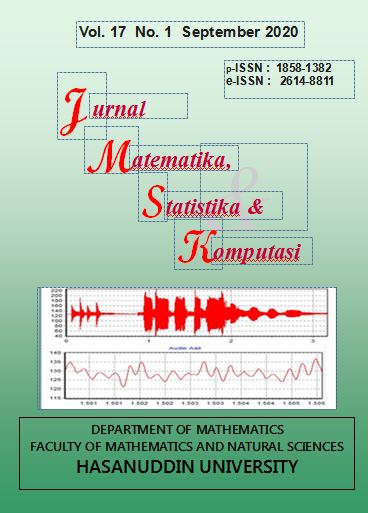Vector Autoregressive Integrated (VARI) Method for Forecasting the Number of Internasional Visitor in Batam and Jakarta
DOI:
https://doi.org/10.20956/jmsk.v17i1.10536Keywords:
forecasting, international visitor, Vector Autoregressive Integrated (VARI), Mean Absolute Percentage Error (MAPE)Abstract
Forecasting methods that are often used are time series analysis, the Autoregressive (AR) method. The AR method only carries out univariate analysis, meaning that it carries out a separate model between the number of international visitor coming to Indonesia through Batam and Jakarta. Though there is a possibility, the number of international visitor arriving through Jakarta affects the number of international visitor arriving through Batam. Therefore, in this study the Vector Autoregressive Integrated (VARI) method is used. The VARI model is used on the number of international visitor arrivals per month at Batam and Jakarta for the period Januari 2014 – December 2019. VARI model formation through several stages, namely stationarity test, autoregressive order determination, VARI model formation, and diagnostic checking of the model. With the VARI model, VARI(5,1), the two significant simultaneously equation results are obtained. The Mean Absolute Percentage Error (MAPE) in this model are as follows 1,98% and 2,48% in predicting the number of international visitor arrivals in Batam and Jakarta. In this study also forecasting the number of international visitor arrivals in Batam and Jakarta in January – December 2020Downloads
References
Badan Pusat Statistik (BPS). 2020. Tabel Dinamik Jumlah Kunjungan Wisman. https://www.bps.go.id/ (diakses tanggal 20 Juni 2020).
Enders, Walter. 2004. Applied Time Series Econometrics. New York: John Wiley & Sons Inc.
Hardani, P. R., Hoyyi, A., Sudarno. 2016. Peramalan Laju Inflasi, Suku Bunga Indonesia dan Indeks Harga Saham Gabungan Menggunakan Metode Vector Autoregressive (VAR). Jurnal Gaussian, Vol. 6, No. 1, Tahun 2016, pp. 101-110.
Ibnas, R., Salam, N., dan Agustina, N. 2019. Implementasi Metode Vector Autoregressive (VAR) dalam Meramalkan Jumlah Penduduk (Studi Kasus: Kabupaten Gowa). Journal Matematika dan Statistika serta Aplikasinya, Vol. 7 No. 2 (2019), pp. 56-61.
Makridakis, McGee, dan Wheelwright. 1999. Metode dan Aplikasi Peramalan Edisi Kedua. Diterjemahkan oleh Suminto, H. Jakarta: Binarupa Aksara.
Media Indonesia. 2018. https://mediaindonesia.com/read/detail/192746-pariwisata-indonesia-peringkat-9-di-dunia (diakses tanggal 10 Maret 2020).
Ranangga, T., Sumarjaya, I., dan Srinadi, I. 2018. Metode Vector Autoregressive (VAR) dalam Peramalan Jumlah Wisatawan Mancanegara ke Batam. E-Jurnal Matematika Vol. 7 (2), Mei 2018, pp. 157-164.
Sihombing, P. Robinson dan Susilowati, B. Endar. 2019. Aplikasi Model Vector Autoregressive (VAR) pada Data Tamu Mancanegara di Hotel Bintang dan Non Bintang di Daerah Istimewa Yogyakarta. Jurnal Statistika dan Aplikasinya (JSA), Vol. 3, No. 2, Desember 2019.
Wei, William W.S. 2006. Time Series Analysis Univariate and Multivariate Methods; Second Edition. USA: Pearson Addison Wesley.
Downloads
Published
How to Cite
Issue
Section
License

This work is licensed under a Creative Commons Attribution 4.0 International License.
Jurnal Matematika, Statistika dan Komputasi is an Open Access journal, all articles are distributed under the terms of the Creative Commons Attribution License, allowing third parties to copy and redistribute the material in any medium or format, transform, and build upon the material, provided the original work is properly cited and states its license. This license allows authors and readers to use all articles, data sets, graphics and appendices in data mining applications, search engines, web sites, blogs and other platforms by providing appropriate reference.








